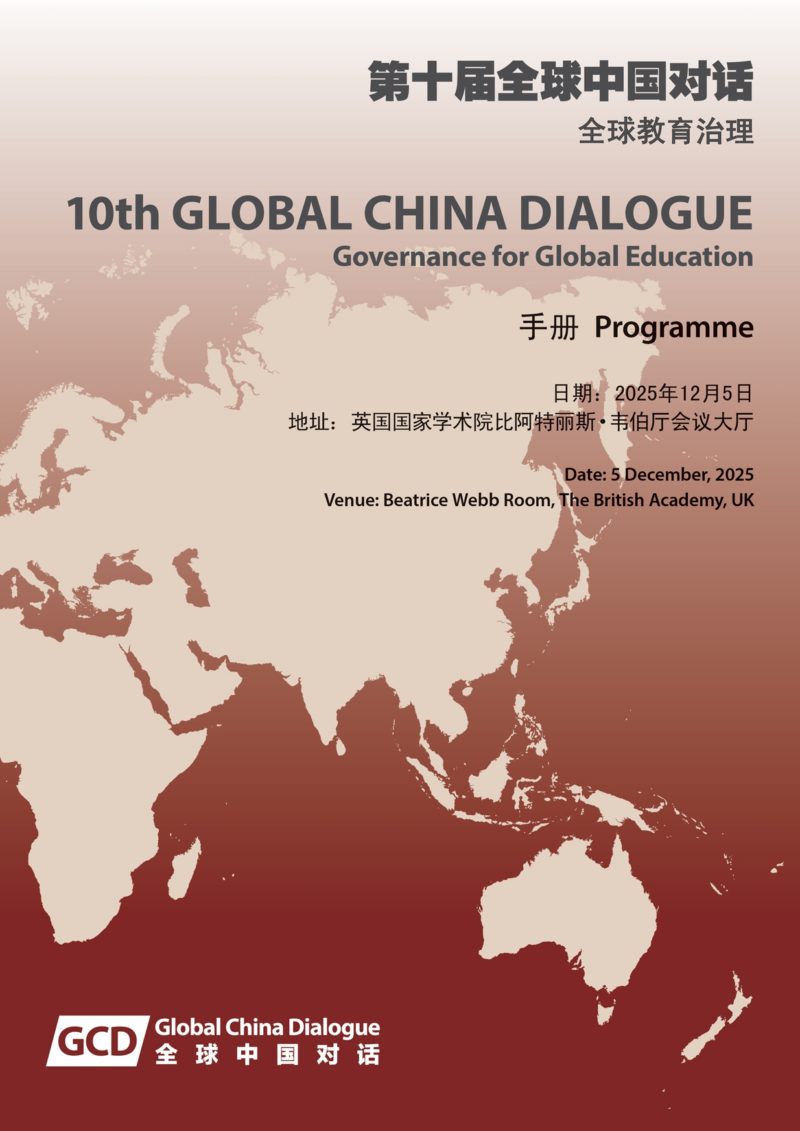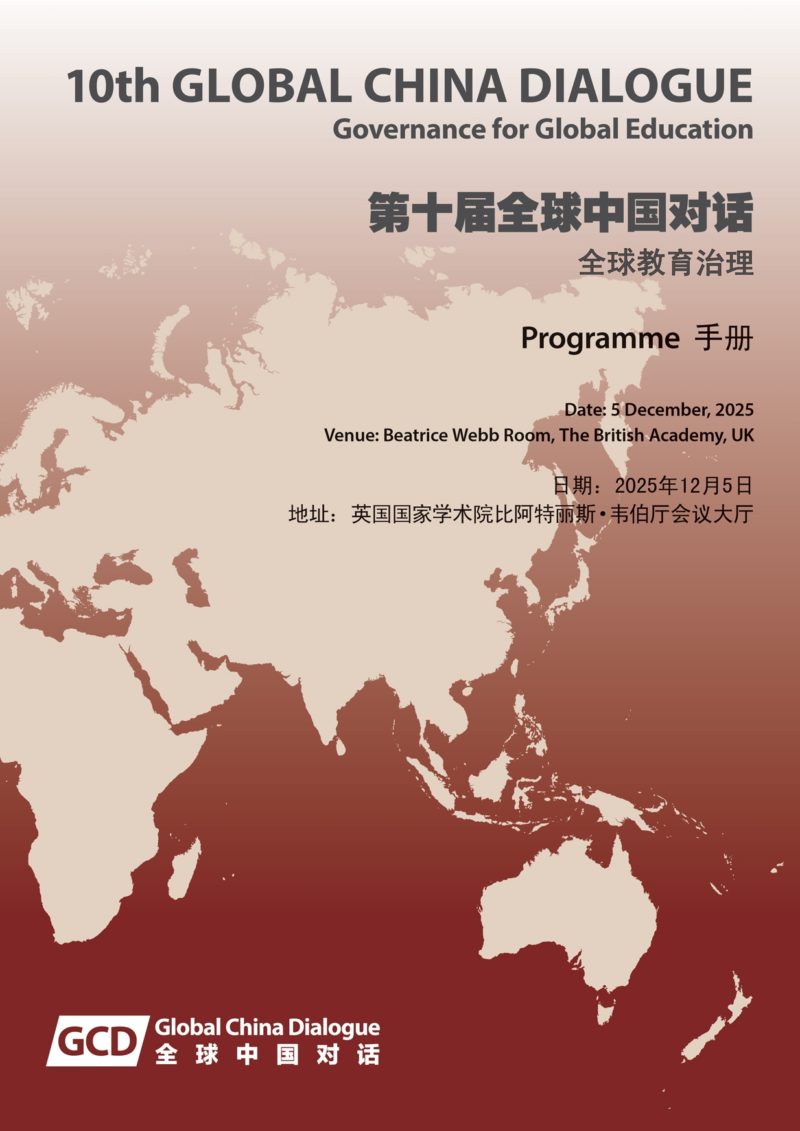
第十届全球中国对话——全球教育治理
第十届全球中国对话论坛会议通知
继成功地举办了九届全球中国对话论坛Global China Dialogue Fourms 之后,第十届全球中国对话——全球教育治理,将于2025年12月5日(星期五)在英国国家学术院(British Academy)举行。本届对话将聚焦如何通过政策协同、国际合作、公平保障、质量提升与制度创新,推动全球教育的可持续发展。
教育作为实现社会公正、促进全球共同繁荣、应对未来变革的重要基石,日益依赖跨国合作、多方参与与科技赋能。尤其是在人工智能、大数据等新兴技术深刻重塑教育模式与学习生态的背景下,全球教育治理正面临前所未有的机遇与挑战。
本届对话将搭建一个多元交流的平台,汇聚政策制定者、学者、教育工作者、企业代表和国际组织,共同探讨全球教育治理的新理念、新机制与新路径。
本届对话主办单位
- 英国全球中国学术院
- 英国兰卡斯特大学ESRC语料库社科研究中心
- 英国埃克塞特大学人文、艺术和社会科学学部
- 中国北师香港浸会大学中华文化传播研究院
本届对话组委会
主席
- 托尼·麦肯勒里 Tony McEnery 教授,全球中国学术院院士及理事会主席,英国社科院院士及理事会理事,英国皇家艺术院院士;兰开斯特大学语言学和英语语言学系杰出教授
- 常向群教授,英国皇家艺术院院士;全球中国学术院院士及院长;伦敦大学学院荣誉教授(2015-20),中国南开大学特聘教授
- 李利教授,英国埃克塞特大学协理副校长(全球事务),人文、艺术与社会科学学部教授;中英人文高等教育联盟(UCHAHE)英方副秘书长
- 黄煜教授,中国北师香港浸会大学 (BNBU) 协理副校长,中华文化传播研究院常务副院长
秘书长
- 李伯一教授,全球中国学术院副院士及中方理事会秘书;南京财经大学工商管理学院教授
- 梁凯先生,全球中国学术院项目专员;英国 MELScience 商务总监
成员(按姓氏拼音顺序)
- 邴正教授,全球中国学术院院士及理事会中方主席、吉林大学前常务副校长、中国社会学会前副会长
- 程原博士,全球中国学术院信托人会信托人;罗盛咨询公司大中华区主席
- 马丁·雅克 Martin Jacques 教授,全球中国学术院院士,英国学者、记者、政治评论员及作家;兼任英国及中国多所知名大学的高级研究员和客座教授
- 李嵬教授,英国学术院院士,英国社科院院士,英国皇家艺术院院士,全球中国学术院院士及理事会非执行主席;伦敦大学学院教育与社会学部部长
- 巴纳比·鲍威尔 Barnaby Powell 先生,英国英中理解协会理事会成员
- 罗兰Laurence Roulleau-Berger教授,全球中国学术院院士和欧洲事务副院长;法国国家科学研究中心(CNRS)研究主任;法国里昂高等师范学院社会科学研究中心教授。
- 彼得·施罗德 Peter Schröder 教授,全球中国学术院院士及副院长;伦敦大学学院历史系欧洲与国际社会和政治研究教授
- 埃琳娜·塞米诺 Elena Semino 教授,英国社科院院士,英国皇家艺术院院士,兰开斯特大学语言学和英语语言学系教授, ESRC语料库社科研究中心前主任
- 园田茂人Shigeto Sonoda 教授,全球中国学术院院士及副院长(亚洲事务负责人);日本东京大学亚洲高级研究所比较社会学与亚洲研究教授
- 谢立中教授,全球中国学术院院士及中方院长,北京大学社会学人类学研究所前所长和社会学系前主任、中国社会理论研究会前会长
- 张晓东教授,南京财经大学创新创业研究院院长;敏捷智库总裁;全球中国学术院中方非执行主席
本届对话四大版块
- 治理模式创新与技术赋能:本版块探讨协同治理、模式创新以及人工智能、大数据与数字平台在教育中的应用。同时也将关注全球数字鸿沟及人工智能在弥合或加深教育不平等方面的双重作用。尽管技术进步有潜力带来巨大的经济利益,但目前全球仍有约26亿人无法上网,这加剧了不平等与贫困问题。此外,论坛将比较不同制度背景下对教育技术采纳与监管的模式差异,探讨技术在多元治理结构中是如何与本地文化逻辑互动,形成不同的教育创新路径。
- 教育公平、包容与质量保障:本版块聚焦于权利保障、研究诚信的推动,以及通过评估、认证和教师培训提升教育质量。议题将涵盖因贫困、性别、地理和冲突等因素造成的教育鸿沟,并探讨在危机情境中如何保障教育的持续进行。研究显示,全球教育体系中大量使用源于西方规范的课程内容,可能削弱本地语言、传统与知识体系。此外,在缺乏对教育背景(如新儒家传统)理解的前提下进行全球教育教学,会加剧国际学生适应不同教学体系的困难。性别差距亦为核心问题之一,基础教育及高等教育中不平等的受教育机会仍然严重。本版块将鼓励对比研究不同教育制度下如何定义和衡量“公平”与“质量”,反思多样文化语境中全球教育标准的可移植性与适应性。
- 全球教育政策与国际合作:本版块将探讨政策框架、国际组织的角色,以及通过大学联盟与数字平台实现的跨国合作。讨论将聚焦于如何在推动全球胜任力的同时,保持文化相关性和本土知识体系。例如,英语在全球教育中的主导地位引发了对多语教育价值及本地语言保护的担忧。多语种教育有助于构建包容性社会,并在保护非主流、少数族裔及原住民语言方面具有关键作用。此外,本版块将比较不同国家在高等教育治理中对学术自由、语言政策及国际合作机制的制度安排与文化理念,探索教育全球化中的差异性路径与治理逻辑。
- 教育融资与可持续发展:本版块关注教育融资机制、国际援助,以及教育与科技、产业融合以支持创新与包容性增长。全球教育融资面临一系列关键问题,尤其是议程的主导权应由政府、捐助方还是私人机构掌握?教育资金不足严重威胁可持续发展。若要在2030年前实现可持续发展目标第4项(SDG4),低收入及中低收入国家每年仍存在970亿美元的融资缺口。本版块亦将探讨不同国家或地区在教育投入模式、政府与市场角色、资源分配原则等方面的制度变迁与文化基础,为理解教育融资的全球多样性提供比较视角。
通过多元视角和跨界对话,第十届全球中国对话旨在为全球教育治理贡献中国智慧与国际经验,携手构建一个更加公平、优质、包容和可持续的全球教育生态。
- 2025年7月31日:提交主题摘要的截止日期。
- 2025年11月8日:演讲者提交演讲稿和PPT的截止日期。
- 2025年11月11日:注册的最终截止日期。
- 2025年11月25日:提供英文、中文和双语版本的会议程序下载。
- 2025年12月5日:第十届全球中国对话正式举行。
- 会议记录将于2026年出版,包含转录记录、双语翻译和编辑内容。
我们诚邀来自不同学科、领域和地区的投稿,深入探讨技术与社会转型时代全球教育治理所面临的挑战与机遇。
同时,我们也欢迎机构单位根据我们制定的《合作单位指南》参与本次对话,担任联合主办、协办、支持或赞助单位。
- 联系人:梁凯
- 邮箱:dialogue@gca-uk.org 或 info@globalchinaacademy.org
相关信息

10th Global China Dialogue: Governance for Global Education
Call for Papers
Following nine successful Global China Dialogue (GCD) Forums, the 10th GCD (GCD10) – ‘Governance for Global Education’ – will be held at the British Academy on Friday, 5 December 2025. GCD10 will focus on how to promote sustainable development in education worldwide through policy coordination, international cooperation, equity assurance, quality improvement, and institutional innovation.
As a vital foundation for achieving social justice, fostering global prosperity, and addressing future transformations, education increasingly relies on cross-border collaboration, multi-stakeholder engagement, and technological empowerment. In particular, with the profound impact of emerging technologies such as Artificial Intelligence (AI) and big data reshaping educational models and learning ecosystems, global education governance faces both unprecedented opportunities and challenges.
This Dialogue will provide a platform for diverse conversations, bringing together policymakers, scholars, educators, business leaders, and representatives from international organizations to explore new ideas, mechanisms, and pathways for global education governance.
Organizers:
- Global China Academy, UK
- ESRC Centre for Corpus Approaches to Social Science, Lancaster University, UK
- Faculty of Humanities, Arts, and Social Sciences, University of Exeter, UK
- Institute for Communication Studies of Chinese Culture, Beijing Normal-Hong Kong Baptist University (BNBU), China
Organizing committee:
Chairs
- Professor Tony McEnery FAcSS FRSA, FGCA and Chair of Global China Academy Council; Distinguished Professor of English Language and Linguistics at Lancaster University; Council Member of Academy of Social Sciences, UK
- Professor Xiangqun Chang FRSA FGCA and President of Global China Academy; Honorary Professor of University College London (2015-20), UK; Distinguished Professor of Nankai University, China
- Professor Li Li, Associate Pro-Vice-Chancellor for Global Engagement in the Faculty of Humanities, Arts, and Social Sciences (HASS), University of Exeter, UK; Deputy Secretary General (UK) of UK-China Humanities Alliance for Higher Education, UK
- Professor Yu Huang, Associate Vice President, Executive Director of Institute for Communication Studies of Chinese Culture, Beijing Normal University–Hong Kong Baptist University (BNBU), China
General Secretaries
- Professor LI Boyi, Associate Fellow and Secretary of the GCA Chinese Council, Global China Academy; School of Business Administration, Nanjing University of Finance and Economics, China
- Mr Kai Liang, Event Officer, Global China Academy;Director of Business Development of MEL Science, UK
Members (in alphabetical order)
- Professor BING Zheng FGCA, Chinese Chair of Global China Academy Council; Former Vice-President of Jilin University; Former Vice-President of Chinese Sociological Association
- Dr Yuan Cheng, Trustee of the Global China Academy Board of Trustees; Greater China Chairman, Russell Reynolds Associates, China
- Professor Martin Jacques FGCA, a British academic, journalist, political commentator, and author; Senior Fellow and Visiting Professor at several leading universities in the UK and China
- Professor Li Wei FBA FAcSS FRSA FGCA and Director and Non-Executive Chair of Global China Academy Council; Director and Dean of the UCL Institute of Education (IOE), UCL’s Faculty of Education and Society, UK
- Mr Barnaby Powell, Council Member, Society for Anglo–Chinese Understanding, UK
- Professor Laurence Roulleau-Berger FGCA, Vice President for European engagement of Global China Academy; Research Director at the National Centre for Scientific Research; Professor at Triangle, École Normale Supérieure of Lyon, France
- Professor Peter Schröder, FGCA and Vice-President and Founding Fellow of Global China Academy; Department of History and European and International Social and Political Studies, University College London, UK
- Professor Elena Semino FAcSS FRSA, Professor at Department: Linguistics and English Language, Director of ESRC Centre for Corpus Approaches to Social Science (CASS), Lancaster University, UK
- Professor Shigeto Sonoda FGCA and Vice-President of Global China Academy (Asian engagement), UK; Professor of comparative sociology and Asian studies at the Institute for Advanced Studies on Asia for Information Studies, University of Tokyo, Japan
- Professor XIE Lizhong FGCA and Chinese President of Global China Academy; Former Head of Institute of Sociology and Anthropology and Department of Sociology, Peking University; President of Association of Social Theory Studies of China, UK
- Professor ZHANG Xiaodong FGCA and Chinese Non-Executive Chair of Global China Academy Council; Executive Director, Academic Committee of the Chinese Management Association; ECO of Agile Think Tank, China
GCD10 consists of four thematic panels:
- Panel 1 Governance Innovation and Technological Empowerment
This panel explores collaborative governance, model innovation, and the use of AI, big data, and digital platforms in education. It will also address the global digital divide and how AI can either bridge or deepen disparities in education. Advances in technology have the potential to bring immense economic benefits, but an estimated 2.6 billion people remain offline, exacerbating inequality and poverty. The panel will encourage comparative reflections on how equity and quality are defined and operationalised across diverse educational systems and cultural settings. The discussion will include comparative analyses of how different governance cultures and institutional structures shape the adoption, regulation, and integration of emerging technologies in education.
- Panel 2 Educational Equity, Inclusion, and Quality Assurance
This panel focuses on protecting rights, promoting research integrity, and improving quality through assessments, certification, and teacher training. It will address persistent gaps in education due to poverty, gender, geography, and conflict, and explore how education can continue in crisis contexts. Scholarship has provided evidence that global education systems, using curricula rooted in Western norms, can erode local languages, traditions, and knowledge systems. Moreover, teaching global education without awareness of educational backgrounds—such as those shaped by enduring neo-Confucian conventions—creates barriers for international students adapting to unfamiliar pedagogical systems. Gender disparities also feature prominently, with unequal access to basic and tertiary education remaining a significant issue.
- Panel 3 Global Education Policy and International Cooperation
This panel will explore policy frameworks, the role of international organizations, and cross-border collaboration through university alliances and digital platforms. Discussions will address balancing the push for global competencies with the need to preserve cultural relevance and indigenous knowledge. For instance, the dominance of English in global education raises concerns when juxtaposed with the value of multilingualism and the nurturing of local languages. Multilingual education fosters inclusive societies and is pivotal in preserving non-dominant, minority, and indigenous languages. This panel will also compare how different national education systems conceptualize international cooperation, language policy, and academic autonomy, highlighting the institutional and cultural variations in global engagement.
- Panel 4 Education Financing and Sustainable Development
This panel highlights financing mechanisms, international aid, and the integration of education with technology and industry to support innovation and inclusive growth. Critical questions arise regarding the financing of global education—specifically, who controls the agenda: governments, donors, or private actors? Inadequate financing for education threatens sustainable development, with a funding gap of US$97 billion annually looming for low- and lower-middle-income countries to achieve Sustainable Development Goal 4 (SDG4) by 2030. This panel will also examine cross-national differences in educational investment strategies, fiscal governance models, and public-private partnerships, offering a comparative perspective on sustainable financing cultures.
Through diverse perspectives and cross-sector dialogue, the 10th Global China Dialogue aims to contribute both Chinese insights and international experience to global education governance, working together to build a fairer, higher-quality, more inclusive, and sustainable global education ecosystem.
Important Dates for GCD X:
- 31st August 2025: Deadline for submitting abstracts for proposed topics.
- 8th November 2025: Deadline for speakers to submit their notes and PowerPoint presentations.
- 11th November 2025: Final deadline for registration.
- 25th November 2025: Programme available for download in English, Chinese, and dual-language formats.
- 5th December 2025: Date of the 10th Global China Dialogue.
The proceedings of GCD X will be published in 2026, featuring transcribed records, bilingual translation, and editing.
More info
- Registration
- Registration (Chinese)
- GCD10 Call for Participants
- GCD10 Call for Participants (Chinese)
- Abstract Submition
- GCD10 Call for Papers (Download PDF file)
- GCD10 Call for Papers (Chinese)
- GCD10 Partnership Guidelines
- GCD10 Partnership Guidelines (Chinese)
- GCD10 Homepage
- GCD10 Homepage (Chinese)
- GCD series Homepage

